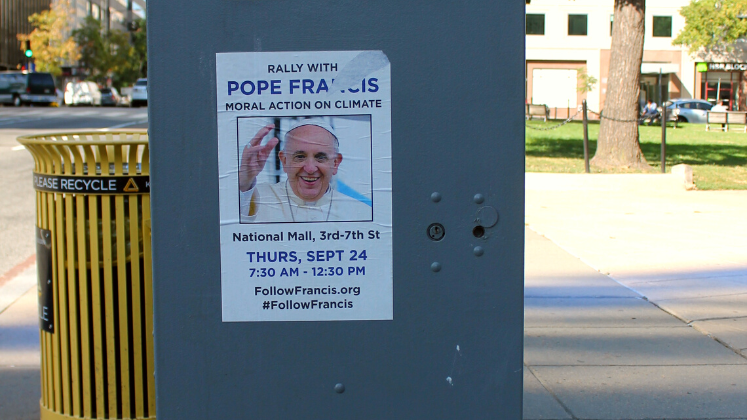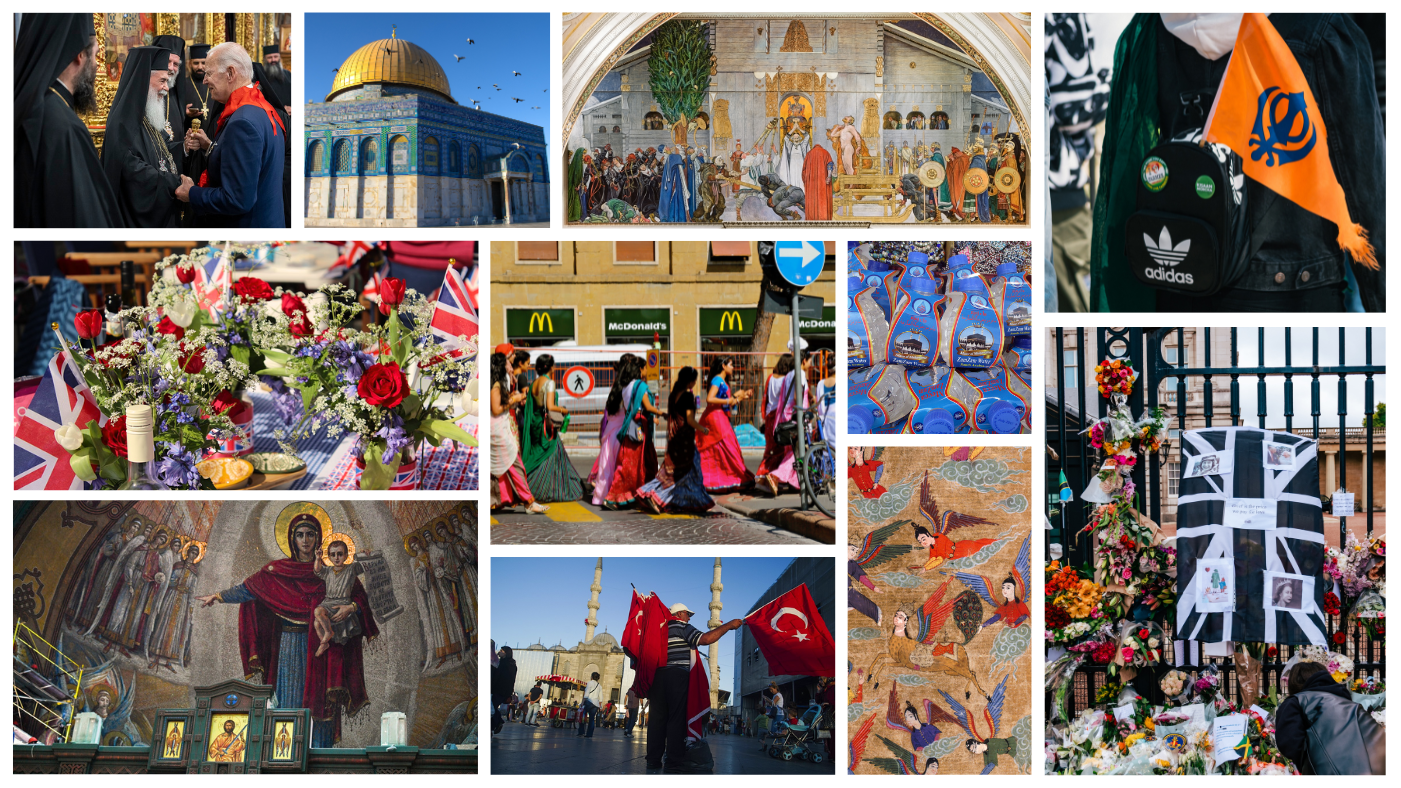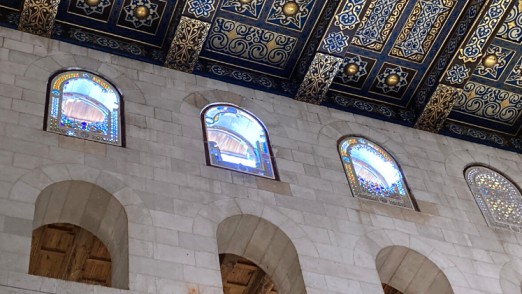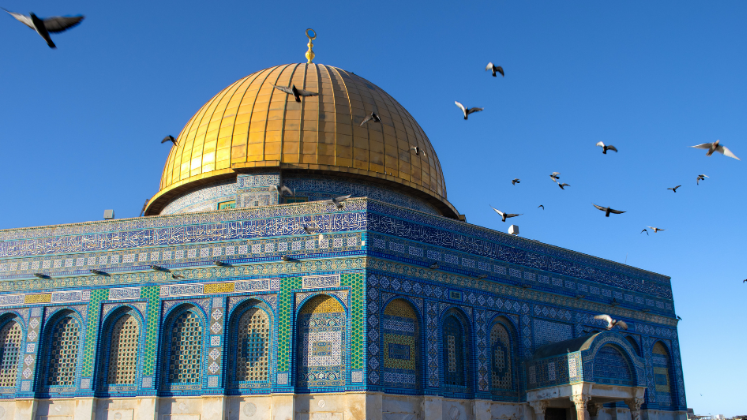With complex religious imaginations playing an ever increasing role in the Israeli-Palestinian conflict, peacebuilding requires a consideration of the spiritual realm as well as the political. Here, Kristian Noll argues for more deliberate personal engagement with diverse religious narratives whether or not one agrees with them.
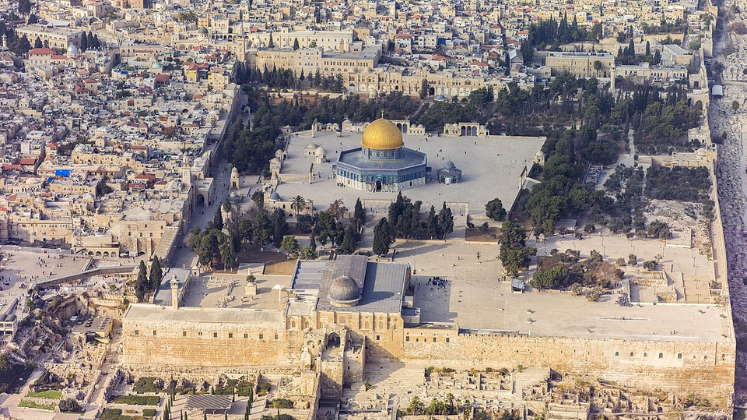
The deeply concerning rise of antisemitic and Islamophobic incidents since 7 October 2023 has compelled broad societal reflections on the role of religion in the Israeli-Palestinian conflict. In response to these incidents, ample commentaries have explored the historical context and ongoing consequences of the conflict, many rightly seeking to combat discrimination and prejudice. When discussing religion, however, these analyses have tended to make the following arguments: (1) in the Holy Land, religion has merely been instrumentalised by secular and fundamentalist movements in pursuit of political goals; and, consequently, (2) centring religion prevents reconciliation and should be excluded from the peacemaking process.
While understandable in their intent, these arguments misrepresent how religious imaginations influence geopolitical realities in the Holy Land and encourage an (ultimately) ineffective secular-political approach to peacebuilding. Because religion intimately and increasingly informs the worldview of those involved on the ground – take the biblical narratives claimed by Israel in asserting a divine right to Jerusalem and Palestinian territory and the sanctity of the Al-Aqsa Mosque to Islam, for example – understanding the current war, the response of third parties to it, and future prospects for lasting peace requires a consideration of the spiritual realm as well as the political.
Rising religiosity in the Holy Land
Because many aspects of the ongoing conflict revolve around ostensibly ‘secular’ concepts such as politics, nationality, and land borders, it is tempting to assume religion has been brought into the conflict. Not so. Religion has always been – and always will be – intimately entangled with any other factors at play. Two pertinent observations demonstrate this point. First, Zionism and Palestinian nationalism may very well have originally been conceived as secular movements (even subscribing to leftist political ideologies), but religious politics on both sides has been on the rise in recent decades. Second, recent conflicts have erupted against a backdrop of rising extremism and violence across the region, fueled in part by geopolitical claims to land ownership and political sovereignty undergirded by religious imaginations. As such, attempting to disentangle faith from these narratives is counterproductive and reflects a Western assumption that religion is an inherently apolitical private experience which must be brought into politics rather than an already integrated aspect of public life.
Since the election of Menachim Begin’s far-right Likud Party in 1977, political Zionism has adopted a more religious narrative. Most recently, this has come in the form of Benjamin Netanyahu’s far-right government elected in 2022 comprising Likud and ultranationalist Jewish parties. This government has made no secret of its support for the claim that the occupied West Bank (or ‘Judea and Samaria’), while officially controlled by the Palestinian Authority, is ultimately a territory divinely bequeathed to the Jewish people. Emboldened by Netanyahu’s government, the settler movement – now consisting of nearly 700,000 individuals living illegally in 150 settlements and over 250 outposts in Palestinian territory – has become increasingly violent in pursuing what many believe is a religious responsibility to restore the land to the Jewish people. It’s no coincidence that 2023 was the most violent year on record in the West Bank.
Equally, the foundation of Palestinian Islamic Jihad in 1981 and Hamas in 1987 marked a significant departure from the largely secular nature of Palestinian nationalism as originally expressed under the Palestine Liberation Organisation. The subsequent electoral victory of Hamas in the 2006 Palestinian parliamentary elections and its role as the de-facto ruling power in the Gaza strip since 2007 has integrated Islam more intimately into Palestinian nationalism, forcing even its traditionally secular rival Fatah to become increasingly religious.
Palestinian claims to the Holy Land might remain more overtly political and historical, but the religious imaginations of both Christians and Muslims undergird these discourses: Jesus was born in Bethlehem, a Palestinian city in the West Bank, and Jerusalem’s Al-Aqsa Mosque – also believed to be the historic site of the Jewish Temple – is the original Qibla and the third holiest site in Islam. The perceived desecration of these venerated religious sites by the Israeli police and military and an ever-shifting precipitous status quo governing control of the compound have been central points of contention for Palestinians in recent conflicts. After all, operations by the Israeli military on the Al-Aqsa compound were cited as catalysts for hostilities in 2021, and Hamas’ attack on Israel in October 2023 was code-named Operation Al-Aqsa Flood.
Can religion explain the American response to the conflict?
The decision of US President Biden to unequivocally (if recently more critically) align the United States with Israel in the current conflict has given rise to moral bewilderment in light of the devastating humanitarian situation in Gaza. Significant external and internal criticism has been rife; however, Biden’s response is not necessarily surprising considered in the context of long-standing US foreign policy vis-à-vis Israel and Palestine. It’s no secret that Israel has been the largest recipient of US foreign assistance since the end of the Second World War, receiving a minimum of $3.8 billion in military funding each year. Undergirding this ‘ironclad’ alliance, however, are not only – as often supposed – strategic considerations, a powerful PR strategy by Israel, or even the fiscal power of the American Israel Public Affairs Committee. Rather, another explanation for longstanding public support of Israel is religion! Two religious imaginations are particular important to understand: Christian Zionism and the theory of dispensationalism. These theologies, based on various interpretations of biblical prophecies codified in the Books of Daniel and Revelation, hold that the repatriation of the land of Israel to the Jewish people is a precondition for bringing about the second coming of Christ and ultimate redemption for believers. The theological conclusion is obvious: if God has predestined these events, who are we to oppose it?
The embrace of these theologies by the evangelical Christian electorate and prominent political figures such as Louis Brandeis, Woodrow Wilson, Mike Pompeo, and Mike Pence has lent political legitimacy to this narrative and moved it from the theological into the political. Christian Zionism was perhaps most explicitly embraced during the Trump Administration, but it remains very present in US policymaking today as demonstrated by the election of Mike Johnson, an evangelical Christian associated with the Christian nationalist movement and vocal in his support for Israel, as Speaker of the House of Representatives.
The importance of religious literacy
Agreeing across difference – a crucial exercise in conflict resolution – compels first an understanding of what informs differing political narratives and how these dynamics manifest a particular response to geopolitical realities. As demonstrated, religion is already embedded in the political ideologies and narratives central to the Israeli-Palestinian conflict. Therefore, relegating religion to the analytical periphery or outright dismissing it produces an incomplete analysis, discounts the perspectives of those experiencing the horrors of war, and will ultimately fail in building a foundation for a peaceful future.
A more effective peacebuilding approach will carefully and thoughtfully re-centre religious literacy in solutions-oriented discussions. On one level, this means ensuring diplomats working in and with the region bring a basic understanding of religious imaginations to the table and are careful not to sideline religion in negotiations for a post-Oslo peace. On another level, there is an imperative for more deliberate personal engagement with diverse religious narratives whether or not one agrees with them. Religion cannot and should not be relegated to the analytical periphery, least of all in the Holy Land.


